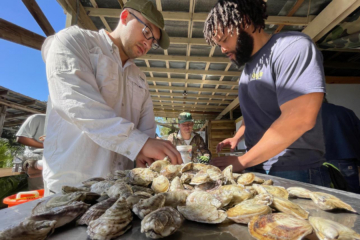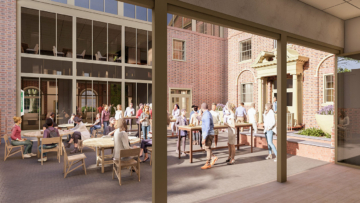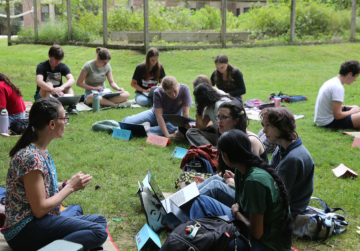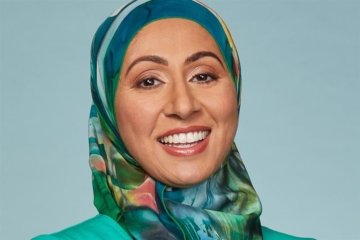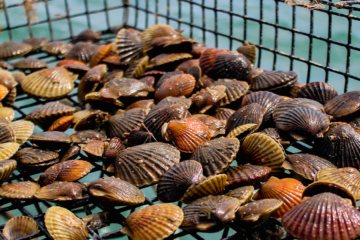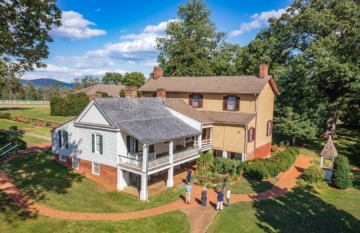New shellfish aquaculture specialization highlights industry-ready graduate students
The following story originally appeared on the website for W&M’s Batten School & VIMS. – Ed.
It was a perfect summer day along the coast of Maine as a van of William & Mary’s Batten School & VIMS graduate students traveled between study sites with Acuff Professor of Marine Science Bill Walton.
En route to another immersive learning session with oyster farmers, Walton broke the news: A sub-concentration in shellfish aquaculture was made official, and those who met the requirements could apply to have it featured on their transcripts. His announcement was met with cheers as the group of master’s and doctoral candidates celebrated the new specialization that spoke to their passions and research interests.
“That we can recognize the extensive knowledge and expertise our students gain here through something like this sub-concentration has been a goal of mine since I arrived,” said Walton, who joined the Batten School & VIMS in 2021 and coordinates the Shellfish Aquaculture Program.
As a proud alumnus, Associate Dean for Academic Affairs Siddhartha Mitra ’97 is familiar with the transformative nature of the graduate program.
“I experienced firsthand how the education and training here combine intellectual rigor with real-world application,” said Mitra. “This new sub-concentration is another perfect example of our commitment to training students to engage directly with industry and community groups, in addition to preparing them to think critically and conduct impactful research.”
Available to graduate students pursuing an M.A., M.S. or Ph.D., the sub-concentration is designed to increase their understanding and knowledge of the opportunities and challenges across the spectrum of shellfish aquaculture. Through immersive coursework and field studies, students will improve their comprehension of the types of shellfish aquaculture practiced locally and around the world. The offering comes as the shellfish aquaculture industry continues to grow, with Virginia ranking as the number one producer of eastern oysters and hard clams in the United States.
“The experiential learning opportunities offered through this sub-concentration allow students to engage with the people and industries most affected by our work in a meaningful way,” said Mitra.
A doctorate with a focus on oyster farmers
Jobs in marine science, including in shellfish aquaculture, exist within both public and private sectors, ranging from academic research to tech innovation. For Ph.D. candidate Matt LaGanke, the new sub-concentration provides a roadmap for students interested in careers that pair sectors together the way you’d pair an oyster with champagne.
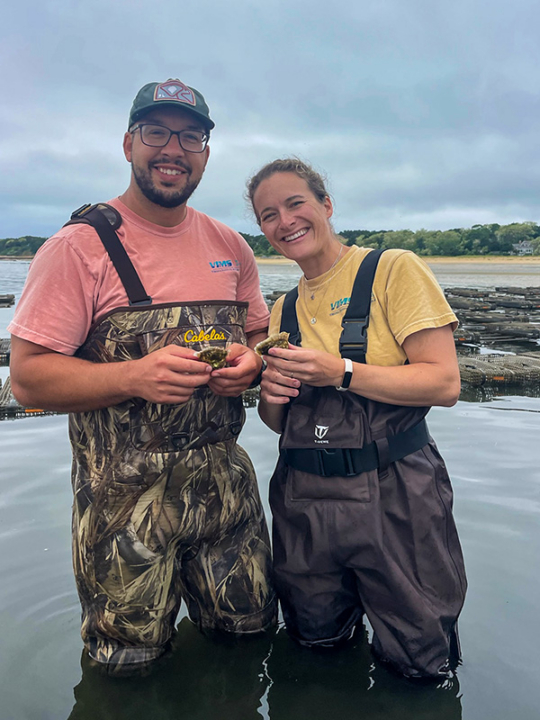
“After working alongside so many oyster farmers I can confidently say that my goal is simply to improve the shellfish aquaculture industry,” LaGanke said. Reflecting on his time at the Batten School & VIMS, he shared that the field is where he “fell in love with the people who make this industry possible — the farmers and producers whose work is a manifestation of their love for oysters and the benefits their businesses provide.”
He adds that their work not only provides a sustainable, healthy source of seafood for Americans, it also provides environmental benefits and employment in smaller, rural coastal communities.
Coursework required for the sub-concentration ranges from the human dimensions of marine science and methodologies of shellfish production to disease dynamics in aquaculture and local and global policies shaping the industry. The classroom experience is equally diverse, with graduate students participating in directed research, engaging in open discussions and literally immersing themselves in the field. The Shellfish Aquaculture in Practice course description notes that “students should expect to get wet and dirty and be tired at the end of each day.”
LaGanke hopes to continue strengthening the connection between academic research and aquaculture innovations.
“I’m very focused on being a part of the solution,” he said. “My goal is to continue supporting shellfish farmers through applied research and the development of technology that I know fits their specific needs.”
The diversity of a master’s degree
Jade Sevelow-Lee M.A. ’26 was one of the graduate students in the van with Walton when the announcement came that the sub-concentration was approved.
“The curriculum that faculty and students have built out is incredibly valuable to anyone interested in learning how their expertise may fit into this field of work,” she said. “It exposes you to the diversity of careers that support this growing industry.”
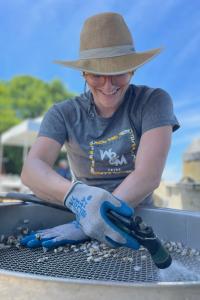
Sevelow-Lee, a recipient of the Chesapeake Bay Foundation’s Oyster Innovators Grant, will be among the first to earn the sub-concentration this spring when she graduates with an M.A. in marine science. During her time at the Batten School and VIMS, she has conducted extensive research on the habitat ecosystem services oyster farms provide and is completing a capstone using video data and community science from oyster farmers to reflect these services.
“It’s kind of funny to step back and recognize that I grew up not eating oysters, not ever really thinking about them, and now they’ve become such a huge part of my life,” she said, adding with a smile, “They’ve become a part of my diet, too. Wait until you try the oysters we grow here — they’re incredible!
“You definitely gain an appreciation for how committed oyster farmers are to their work,” Sevelow-Lee said, reflecting on the long, rewarding days spent in the field. “You appreciate how valuable our research is to them and to this industry. And that appreciation goes both ways. It is the insights and collaboration from farmers that help to make our work possible, creating a feedback loop of innovation and progress. It’s what makes this research and community unique — it’s special.”
With her experience as a graduate student at Batten School & VIMS and an appreciation for research, policy and industry practices, Sevelow-Lee is ready for the next chapter of her career. “Wherever I go next, I know that my experience here has prepared me to lead in shellfish aquaculture, regardless of the angle I approach it from.”
Building on a legacy of leadership
Thanks to forward-thinking investments from both the state and private donors, cutting-edge facilities such as the Acuff Center for Aquaculture, Aquaculture Genetics and Breeding Technology Center (ABC) and Shellfish Pathology Laboratory produce scientific breakthroughs in breeding and genetics while providing critical services such as disease testing and surveillance. The research and breeding efforts at Batten School & VIMS also serve to test innovative technology and equipment, experimental genetics and growing methods and to develop advice and best practices for shellfish farmers around the nation.
“We have been a leader in the field of shellfish aquaculture for decades,” Walton said. “As we built out the curriculum, we worked with our students and partners to design courses of value — so that knowledge and perspective would prepare our graduates for the diversity of career paths available to them in this field. I have not seen any other school that has something quite like this.”
Mitra added, “We’re equipping our graduates with the skills and perspective needed to lead communities in addressing today’s most pressing environmental and economic challenges.”
Through the Batten School’s new sub-concentration, faculty and staff are guiding the shellfish aquaculture industry forward with the development of globally relevant science and industry-ready scientists. Prospective students can learn more about both undergraduate and graduate level opportunities on the website.



